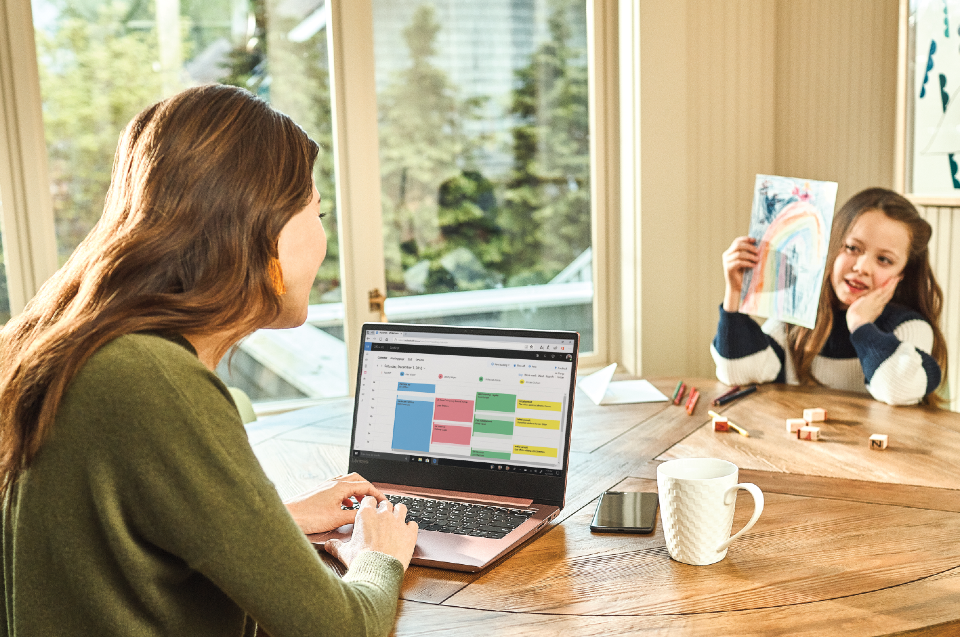
2020 was anything but the roundness that the symbols might suggest. It has been a year of disruption for just about everyone on the planet with extensive lockdowns, working from home, home schooling, virtual meetings and celebrations, entertainment online and almost everything done remotely and remote becoming a synonym of home! With vaccinations having already started and operation “freedom” well under way, it makes me wonder of the impact of the ‘movie’ we experienced last season and the change of habits on the daily lives of millions of women, now seeking a different kind of freedom. Considering the current situation, the reality is that home schooling particularly affects women as they still bear much of the responsibility for childcare, let alone the fact that they are ‘sandwiched’ between caring for children and taking care of the elderly, while at the same time, they are striving to deliver their best at work, especially those in health and social care workers.
Women all of a sudden are faced with a risk of erosion of social rights and perceptions earned over the past decades due to this “going back to the roots” model of everything taking place and evolving in and around the house, their home ground, one might say. The pandemic has brought back in a sense the imbalanced distribution of responsibilities based on traditional gender stereotypes. Could this be a very short-sighted view of the current situation? I would say no, not in our part of the world, when considering the recent history and the amount of change that has taken place over a short period of time, that in itself suggests a vulnerability of falling-back to what society and not the individual feels comfortable with over the centuries. Gender equality is neither about the percentage participation in the workforce nor the amount on the paycheck. It is about challenging perceptions regarding men and women roles in the family and in society, in being more inclusive, and eliminating gender-based bias. That is why it is extremely important to enable a true and sustainable behavioural change. This inevitably is a journey that takes time and requires the right support framework and behaviours to enable it.
The pandemic taught us a lot so far and keeps providing opportunities to develop and take the lead where needed the most. For people that know me well, they would characterize me as an eternal optimist, albeit grounded in reality. I believe in the magic that people can create when given the opportunity, then everything is possible. It all starts from self-awareness and confidence in bringing our authentic self everyday to work and in everything we do. This is so basic and of paramount importance! Being our true selves brings an inherent sense of confidence and serenity, removing any background anxiety associated with the strive to be someone else or rather fall in the trap of being the person who other people expect you to be. Many years back, one of my sports club teammates shared that she makes her life easier by doing exactly that, being the person that other people expected her to be. I wonder, was she really making it easier for herself? That must have been a lot of work and also at the end of the day unsettling for her, in building her confidence, enabling her to create and defend her space, as well as to be assertive on her decisions. She found it easier to put a mask on, as this was her way of shying away from her authentic self. The pandemic triptych of no-touch, mask, distance makes me wonder whether this in fact a challenge-turned-opportunity for women. An opportunity to do our own soul searching and be able to get to know ourselves better and come to terms with our own wants and needs.
Emotions in a no-touch world
A no-touch world is indeed the challenge we all have in terms of valuing the importance of hands-on work and feelings. Taking someone by the hand to show them how things are done and nurture their learning path, is not the same anymore. Now this needs to be done virtually, or at least in an aseptic way…there is something missing! Learning to live in a world like this, offering a helping hand (!) while still maintaining the ‘human touch’ is extremely difficult and calls for inventing creative ways of communication and developing self-support to neutralize negative effects and gain emotional freedom and strength. A no touch world, creates affection deprivation, with implications for mental health, anxiety and potential aggression. Women have a critical role to play here as mothers, care providers, partners and it is important that they develop immunity to the adverse effects of the no touch world, starting from developing the emotional strength themselves to be able to support others and build the confidence with high fidelity and trust in the process.
Wear your mask, it is good for you!
A mask always had a negative connotation in terms of avoiding to show your face and be your true self, escaping from the moment, pretending to be someone else. While to a great extent this can be true, I also believe that for many women the mask can be liberating as the false feeling of hiding, not been ‘seen’, hence being under observation and scrutiny, allows them to be their true selves in terms of behaviour. This means, more confidence, stronger and clearer voice to be able to come through the mask material, straight posture and look, as the eyes are the only visible parts of the face to convey expressions and emotions. Wearing a mask for the pandemic is a great opportunity for the quieter and shy women to practice being loud and looking at the challenge straight in the eye, turning this into an opportunity to overcome their biggest fear, that of failing on the expectations that others have for them.
Bridge the distance
Time and distance have always been two factors acting as a cogwheel to women’s learning and development path. How many times have we heard the phrases “I never have the time…” or ” it is difficult for me to get there…” The very practical positive impact of pandemic support response, as I call it, is that online activities and engagement have become the norm. Think about online shopping, at least for household shopping this is a great time saver, allowing for more time to do other things. Although travel by definition is limited, travel time to learning destinations and cultural experiences is low and the distance between places is virtually bridged. Women can indeed do more now. It is not about doing everything and more, but rather making it possible to learning and experience more. It is about participating in communities and forums that a few months back were scarcely available online, hence, not accessible from home or even from another country.
These are only some thoughts provoked by my reflections with the turn of the year and our journey thus far. I strongly believe that even the worst year by many standards, has given us experiences and opportunities that can shape our future in a positive way.
The Women at Microsoft group in Central and Eastern Europe is committed to playing a role in this, by creating connections and enabling learning and advocacy for women across our region. I invite you to join us on this journey!
Source: Thoughts on Gender Resilience







